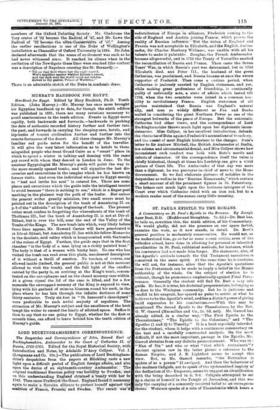LORD BUCKINGHAMSHIRE'S CORRESPONDENCE.
The Despatches and Correspondence of John, Second Earl of Buckinghamshire, Ambassador to the Court of Catherine II. of Russia, 1762-1765. Edited for the Royal Historical Society, with Introduction and Notes, by Adelaide D'Arcy Collyer. Vol. I. (Longmans and Co. 10s.)—The publication of Lord Buckingham- shire's despatches from the papers at Blickling casts a new light upon a difficult period of English foreign affairs, and also upon the dales of an eighteenth-century Ambrisaidor: The original traditional Russian policy was hostility to -Swed.en, and on this understanding England obtained a treaty with' her in 1742. Then came Frederick the Great. England found it necessary again to make a Russian alliance to protect herself against th coalition of France, Prussia; and Sweden. The result wail redistribution of Europe in alliances, Frederick coming to the side of England and Austria joining France, which provea the reality of Russian inflasifen.--Bnt the union of England and Prussia was not acceptable to Elizabeth, and the English Ainbas• sador, Sir Charles Banbury Williams, was unable with all his talents to make it palatable. Douglas, the French Ambassador became all-powerful, and in 1756 the Treaty of Versailles marked the reconciliation of Russia and France. Then came the Seven Years' War, in which Russia's part was determined, but in 1762 Elizabeth died, and Peter III., the husband of the great Catherine, was proclaimed, and Russia became at once the sworn supporter of Frederick. Then came a curious period, when Catherine is jealously courted by English statesmen, and yet. while making great professions of friendship, is continually guilty of unfriendly acts, a state of affairs whieh lasted till 1793, when the two countries were joined in a common hos- tility to revolutionary France. English statesmen of all parties maintained that Russia was England's natural ally, and men so widely different as Fox and Burke united in considering the great Northern Power as one of the strongest bulwarks of the peace of Europe. But the autocratic Catherine had other views, and the correspondence of Lord Buckinghamshire throws much light upon her diplomatic incon- sistencies. Miss Collyer, in her excellent introduction, defends the charac ter of Bute against Frederick's accusations of treachery and the assent of most English historians to the charges. Bute's letter to Sir Andrew Mitchell, the British Ambassador at Berlin, is a solemn and circumstantial denial, and Miss Collyer shows how inconsistent such conduct was both with Bute's merits and defects of character. Of the correspondence itself the value is chiefly historical, though at times his Lordship can give a vivid picture of Court life. The Ambassador of that day was more than a diplomat, he was purveyor-in-chief of news to the Home Government. So we find elaborate pictures of notables in the despatches as well as in the "Russian Memoranda," which contain a short account of all the prominent figures in St. Petersburg. The letters east much light upon the tortuous intrigues of the Court over which Catherine ruled with an iron rod, but to a modern reader most of the names carry little meaning.


















































 Previous page
Previous page